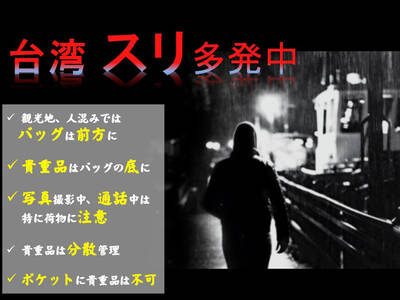Baseball fever reached a climax when the Brother Elephants won the 2003 Taiwan Series. But many people do not realize that the blind also enjoy playing baseball.
In fact, visually-impaired people not only play baseball, they also have their own baseball team, their own equipment, a regular practice schedule and their own base of supporters.
"Actually, many people who cannot see are involved in baseball games, and not just as fans. They play baseball just like normal people do," said Chen Yun-ying (
"They [blind players] see desire, determination and teamwork in the game and in many cases they even out-perform sighted players. Playing baseball is not a privilege reserved for sighted people," Chen said.
Beep baseball, as its name implies, is a ball game played with a normal softball containing a small sound module, which helps blind people keep track of the ball.
In beep baseball, each team is permitted six turns to bat, during which it attempts to score runs by having its batters hit the beeping ball into fair territory and reach a buzzing base.
Each team has its own sighted pitcher and catcher.
"There are now six beep baseball teams in Taiwan. Two are in Taipei, three in Taichung and one in Ilan," said Lin Hsin-hong (
Lin suffers from retinitis pigmentosa, an inherited disease in which eyesight degenerates with age. He will eventually become completely blind.
Lin and his team represented Taiwan at the Beep Baseball World Series in Los Angeles in 1997.
"After playing beep baseball, I regained confidence and hope. I found that I could participate in sports just like other people. It felt like I was reborn," Lin said.
The game enables players to move around without the assistance of a cane, guide dog or helper.
"The feeling of freedom is great," he said.
Four star pitchers of the Brother Elephants showed their support by attending a news conference to introduce the sport to the media.
Pitcher Liu Wen-mao (
"I respect their [blind players'] resolution and perseverance, which is exemplary," Liu said.

GENSLER SURVEY: ‘Economic infrastructure is not enough. A city needs to inspire pride, offer moments of joy and foster a sense of belonging,’ the company said Taipei was named the city with the “highest staying power” in the world by US-based design and architecture firm Gensler. The Taiwanese capital earned the top spot among 65 cities across six continents with 64 percent of Taipei respondents in a survey of 33,000 people saying they wanted to stay in the city. Rounding out the top five were Vietnam’s Ho Chi Minh City (61 percent), Singapore (59 percent), Sydney (58 percent) and Berlin (51 percent). Sixth to 10th place went to Monterrey, Mexico; Munich, Germany; Sao Paulo, Brazil; Vancouver; and Seoul. Cities in the US were ranked separately, with Minneapolis first at

The Japan-Taiwan Exchange Association has cautioned Japanese travelers to be vigilant against pickpockets at several popular tourist spots in Taiwan, including Taipei’s night markets, the Yongkang Street area, Zhongshan MRT Station, and Jiufen (九份) in New Taipei City. The advisory, titled “Recent Development of Concerns,” was posted on the association’s Web site under its safety and emergency report section. It urges travelers to keep backpacks fully zipped and carried in front, with valuables placed at the bottom of the bag. Visitors are advised to be especially mindful of their belongings when taking photos or speaking on the phone, avoid storing wallets and

Scoot announced yesterday that starting in October, it would increase flights between Taipei and Japan’s Narita airport and Hokkaido, and between Singapore and Taipei. The low-cost airline, a subsidiary of Singapore Airlines, also said it would launch flights to Chiang Rai in Thailand, Okinawa and Tokyo’s Haneda airport between December and March next year. Flights between Singapore and Chiang Rai would begin on Jan. 1, with five flights per week operated by an Embraer E190-E2 aircraft, Scoot said. Flights between Singapore and Okinawa would begin on Dec. 15, with three flights per week operated by Airbus A320 aircraft, the airline said. Services between Singapore

ENDORSING TAIWAN: Honduran presidential candidate Nasry Afura said that Honduras was ‘100 times better off’ when it was allied with Taipei The Ministry of Foreign Affairs yesterday said it would explore the possibility of restoring diplomatic relations with Honduras based on the principle of maintaining national interests and dignity. The ministry made the remarks in response to reporters’ questions regarding an article titled: “Will Taiwan Regain a Diplomatic Ally?” published in The Diplomat on Saturday. The article said Honduras’ presidential election in November could offer Taiwan the chance to regain an ally, as multiple candidates have promoted re-establishing diplomatic relations with Taiwan. Honduras severed diplomatic ties with Taiwan in March 2023 in favor of Beijing, but since switching its diplomatic recognition,